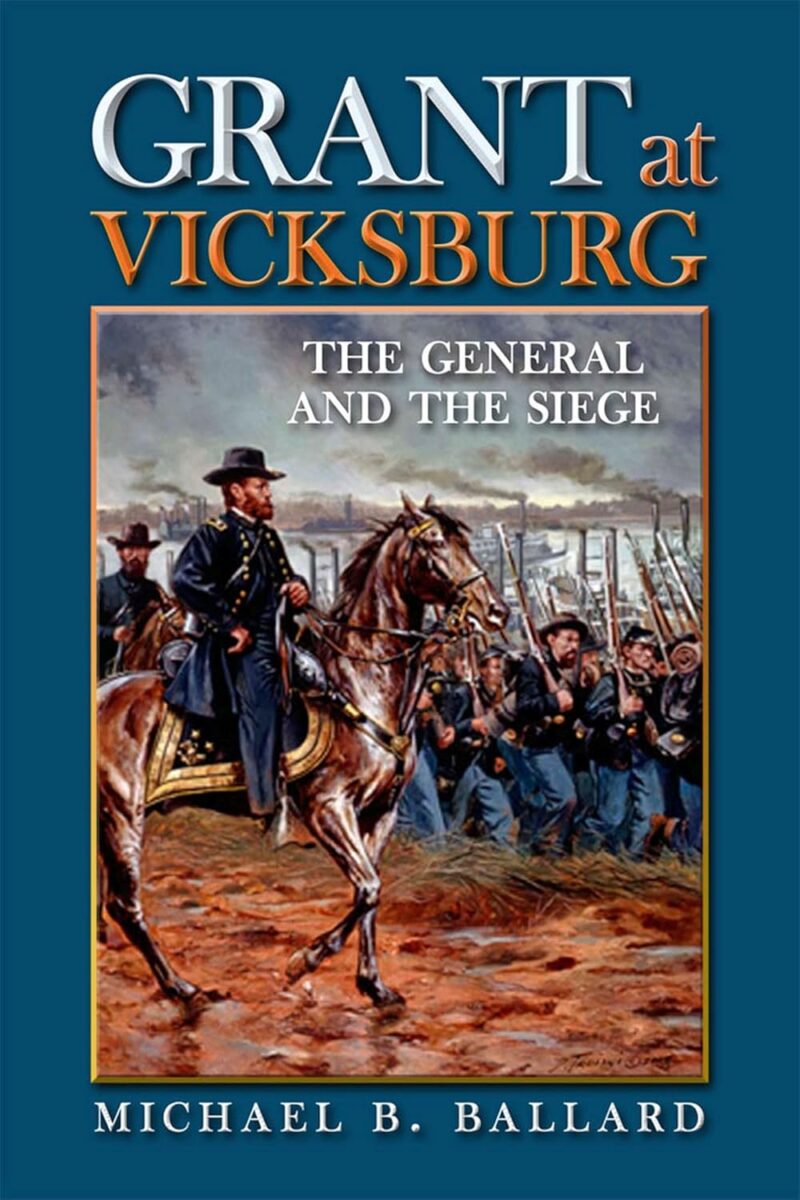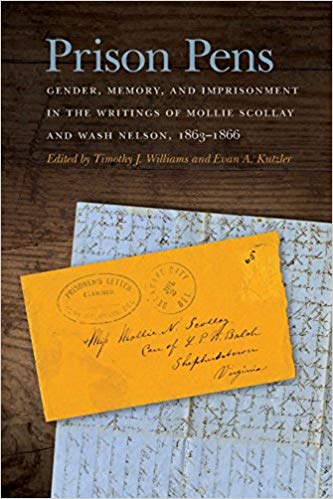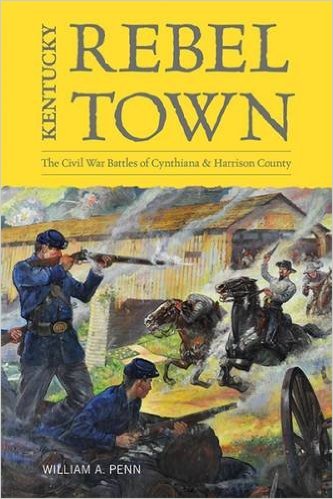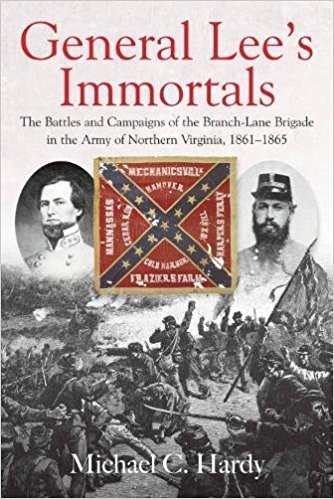Grant at Vicksburg is much more than a biography or campaign study. The depth of Michael Ballard’s research into Grant’s correspondence and routine make it a study in command, control, communications, and intelligence (what Grant knew and when he knew it). As such, it is also a study in uncertainty, miscommunication, and the limits of control across even a relatively limited area of operations (specifically that between Vicksburg and Jackson). Because Ballard has shaped his chapters chronologically but thematically, Grant at Vicksburg also contains significant biography, particularly regarding Grant’s drinking, and breaks new ground in its close treatment of racism in the Union army.
The story itself is not new; Ballard covered the campaign in greater detail in Vicksburg: The Campaign that Opened the Mississippi (2004). Here he devotes one chapter to the “long road to Vicksburg,” beginning as far back as Belmont to provide a sense of Grant’s development and the trajectory of operations in the western portion (that between the Mississippi and Tennessee rivers, and southward into the state of Mississippi) of the Western Theater. This chapter presents important new analysis, however: Ballard explicitly asserts Grant’s passivity between Shiloh and December 1862. This passivity was certainly due in large part to Halleck’s assumption of command, making Grant a powerless second, after Shiloh, but Ballard shows that Grant did not resume the aggressiveness of Belmont, Henry, and Donelson until the very end of the year, well after Halleck had gone east. Indeed, Grant’s management of the battles of Iuka and Corinth was tentative, denying subordinates authority to pursue the beaten Rebels. Grant then delayed beginning his offensive against Vicksburg, repeatedly asking for more troops. Does this remind you of another Union general commanding an army during the autumn of 1862? Ballard doesn’t go that far, but he observes that Grant ran “his command as though he must do everything not to lose” rather than seeking victory (4). Of course, that other Union general lost a set of battles and was repulsed from the gates of the Confederate capital, and essentially betrayed the army, if not his country, by leaving John Pope to fight Second Manassas a corps or two short of what McClellan could have provided. But one wonders to what extent one hesitant general benefitted from the relative media quiet of the West, while the other was doomed by the close attention media and president paid to the East.
The other important point evident in the first chapter, and repeated in following ones, is that Grant trusted John McClernand with corps command and important operational assignments. Chapter 5 deals with McClernand’s relief, but the more significant takeaway is that Grant used the obnoxious but capable political general as long as he felt he could, or had to. Grant did not interrupt or delay operations in order to gratify his antagonism against his rival.
Of course, Grant had plenty of other problems to worry about. One was partly self-created—his drinking—though chapter 3 follows recent scholarship (especially Brooks Simpson) in dismissing the story that he became utterly incapacitated during a short leave. Unfortunately for Grant, historiographical rehabilitation comes too late to counter the rumors that hurt his reputation, potentially threatening his command, during the war. After Vicksburg this command was in little danger, and Lincoln gave little weight to this part of Grant’s reputation, in comparison for that for fighting.
A second problem was race: dealing both with “contraband” refugees from slavery and with the racism of his soldiers and subordinates, who abused the freedpeople in a variety of ways. Chapter 4 will therefore be of the greatest interest for social historians. Yet Ballard concludes that Grant “did not back off from promoting the use of freedmen as soldiers” (82), and “did much to temper the tempest of racism” (85).
Grant’s greatest problem, once the siege had begun was his “paranoia” (from the title of chapter 2) about his rear. Despite inflicting a series of defeats on the Rebels, despite the substantial forces he assigned to ward off any Confederate effort to relieve the city, Grant seems to have worried as much about Joe Johnston and company as he did about Pemberton. (Perhaps that says more about Pemberton than Johnston.) Chapters 4, 6, and 7, the heart of Ballard’s narrative, split time between the siege—which previous accounts have skimmed over, in comparison to this—and the efforts to cover the siege against relief. In reality, between Johnston and Confederate numerical inferiority there was little chance of a serious threat of relief, but these chapters amply demonstrate the problems of intelligence and communication in a Civil War campaign. They also show a Grant less imperturbable than we thought we knew.
Chapter 8 concludes the siege with a minute by minute account of the negotiations (in which Grant did not demand unconditional surrender), the capitulation, and the process of paroling the Confederates. Unfortunately, Ballard does not discuss the military outcome of the parole agreement—whether the Rebels kept their word to cease fighting. They certainly displayed a great deal of disingenuousness trying to take freedpeople out of the city, which Grant tried to prevent. No hard conclusions are possible given the uncertain numbers involved, but Grant did the best he could amid the many challenges he faced—which might well be the lowest common denominator summary of Grant at Vicksburg.
That would be insufficient, however. Ballard concludes with several important lessons Grant learned from this pivotal campaign. Most important, though he continued to worry about Johnston at Jackson (with little help from Sherman, whose caution facing Johnston verged on passivity), Grant overcame the hesitation that had plagued him for seven months after the surprise at Shiloh and his relief by Halleck. It was during the Vicksburg campaign, Ballard writes, that Grant became convinced (or relearned) that he could dictate the pace of operations, and make the enemy worry more about his actions than he did about theirs.
Grant learned this in part by re-experiencing, on a much larger scale, the rapid maneuver he had practiced at Fort Donelson, and in part by the need for active attention to the siege. The implication is that he developed the active techniques he employed during the siege of Petersburg at Vicksburg. Finally, Grant learned about managing a larger, more dispersed force than he had commanded during the winter and spring of 1862, and perhaps most important of all, about managing expectations in Washington. In doing these things, Grant developed the operational autonomy, for bold and persistent maneuver and sustained combat, that would win the war in 1864 and 1865. Michael Ballard has crafted a valuable study in Civil War command, on many levels.
Samuel Watson is a Professor of History at the United States Military Academy at West Point and the author of Peacekeepers and Conquerors (2013).





